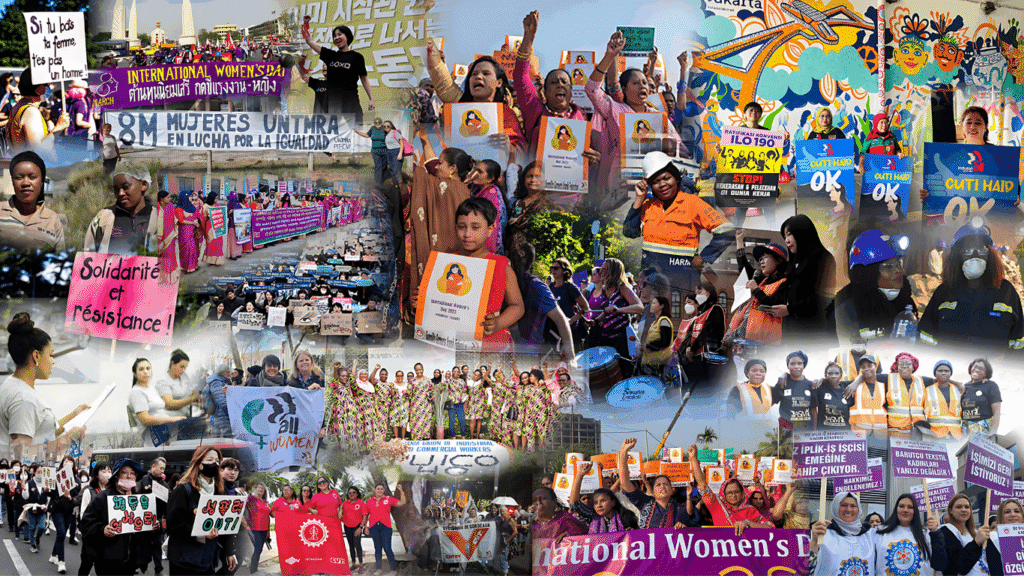29 September, 2025IndustriALL preparatory women’s conference set the stage for a stronger push on gender equality, women’s rights, participation and representation ahead of the global women’s conference, under the slogan: we are ALL in for equality, and Congress in Sydney this November.
The online meeting (18 and 19 September), the first step in IndustriALL women’s conference, reviewed progress, exposed persistent challenges and outlined priorities for the next four years. Assistant general secretary, Christina Olivier, urged participants to reflect on achievements, confront obstacles and define future actions to advance gender equality.
“Gender equality is not a battle of the sexes; it is about building unity, strength and inclusivity of all groups. We will not progress without the commitment of everyone, especially leaders, who must share responsibility to build unions that truly represent all workers,”
said Olivier.
During a panel discussion, union sisters shared experiences from their regions: in Morocco, Soumaia Moukir of UMT Textile described long hours, low wages and lack of social benefits in the textile sector; in Norway, Emma Erlansen of NITO highlighted barriers for women in STEM and efforts to inspire girls through the girls in technology programme; in the USA, Randy Pearson of USW’s Women of Steel and Roxanne Brown, USW's international vice president and IndustriALL vice president for North America, warned of political rollbacks on diversity, equity and inclusion and explained how unions are resisting through bargaining, education and activism in the communities.
A presentation by Joyce Maku Appiah of the Public Utility Workers’ Union (PUWU) showed how systemic barriers left women in Ghana earning 34.2 per cent less than men despite legal protections. PUWU negotiated training and education that enabled 360 women cashiers to transition into higher-paid senior roles without job losses, secured benefits during maternity leave and pushed for women’s fair access to promotions and technical jobs. The union’s work demonstrated that closing the gender pay gap required intentional, sustained action backed by research, education and leadership commitment. Ira Laila Budiman from CEMWU in Indonesia, presented the progress and advancement through the negotiation for the adoption and implementation of zero tolerance policies against GBVH in 93 companies across garment, textile, pharma, cement, pulp and paper sectors. In paralell, safe houses for women workers have been established in companies in eight companies, this has led to an increase in reported cases. Employers are taking preventive actions. These facilities connect internal company mechanisms with government institutions for higher-level cases.
In a session on union and IndustriALL priorities, Alejandra Angriman, CNTI CTAA, Argentina, stressed the need to address the unequal burden of unpaid care, recognize care as a human right and redistribute responsibilities across society. Tanja Lehtoranta, PRO, Finland, highlighted the importance of gender-responsive occupational health, particularly on mental health and psychosocial risks, including those linked to domestic violence, noting the need for individualized approaches. Benedicta Opoku-Mensah, PUWU, Ghana, shared how her union integrated gender perspectives in company transitions, securing a 40 per cent quota for women in training programs and achieving gender parity in engineering recruitment.
The meeting examined how to build union power through more inclusive, gender-equal structures, emphasizing the mobilisation and leadership of women. Sanjyot Vadhavkar, SMEFI, India, highlighted the role of IndustriALL India women’s committee in creating safe spaces for networking, mentoring and linking grassroots women with leadership. Mobilizing and recruiting women sometimes requires bold and tailored strategies. In Thailand, the Auto Part and Metal Workers’ Union engaged non-unionized white-collar women through a sports tournament, leading to over 50 new members (Vipawan Boksantea).
Change must be collective, not led by women alone. Engaging men allies is key. ELA, Basque Country, Spain, embraced feminist practices through a participatory process, starting with a diagnostic of structural biases. Aitor Gomez noted this helped members recognize the lack of a true gender perspective, sparking debates that reduced male resistance. It also helped them understand that the aim was not to discriminate against men, but to work together to change patriarchal culture so that both women and men can enjoy greater freedom. Peter Greenberg, IAMAW, IndustriALL Gender Equality Task Force, also stressed the need for training to raise men’s awareness of women’s struggles.
Plenary sessions emphasized inclusive union practices, family-friendly activities, stronger mentoring and government—not workers—assuming responsibility for social protection. Delegates stressed that equality requires men in leadership to share responsibility and unions to represent all workers, including LGBTQI communities.
These outcomes will shape the 3 November women’s conference and feed into the IndustriALL Global Congress, 4–7 November, where women will make up 40 per cent of delegates and young workers will gain representation for the first time. The conference will set IndustriALL 2025–2029 gender equality and women’s rights framework.
Affiliates also pledged to resist the global rollback of women’s rights and strengthen women’s leadership worldwide.
